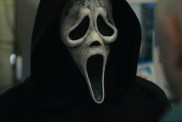
The premise behind The Lazarus Effect is going to sound familiar to anyone whos been watching horror movies for a number of years. The film may explore the idea of bringing back the dead, which weve seen in the likes of Flatliners and Stephen Kings Pet Sematary, but finds a way to do so in a more organic way.
(Note: There are possible spoilers in this review if you know nothing about the general plot from the films marketing.)
The opening experiment to resurrect a pig is filmed in a way that might make you worry youre in for another Blumhouse found-footage moviethe shots from the hallway security cameras might add to this anxiety, as will the introduction of Sara Bolgers Eva, who has been hired to video document the experiments of a group of college scientists. Scientists Zoe (Olivia Wilde) and Frank (Mark Duplass) happen to be in a romantic relationship, and theres a casual nature to the way they run their lab, except when it comes to their primary discovery, the Lazarus serum, which is ejected into test subject corpses in hope to resurrect them using thousands of volts of electricity.
They successfully bring a dog back to life and start observing it for bizarre behavior (and as one might expect, it delivers). When the company that funded their experiments is sold, the buyer shuts them down and takes all their research, giving them one last chance to recreate the dog experiment and film it for posterity, but this time, the experiment goes horribly wrong.
Theres something naturally creepy about the thought of bringing the dead back to life that puts the viewer on edge during the experiment scenes, although there are a few cheap scares thrown in for good measure. It may seem like an odd choice for David Gelb, best known for the foodie doc Jiro Dreams of Sushi, only the dreams in this case being Zoes nightmares about a childhood fire that left her neighbors dead.
If you look at the poster for the movie,, then you probably can presume that Olivia Wildes character will take a dark turn. Like Scarlett Johanssons Lucy, she starts using parts of her brain that allow for abilities like telepathy and telekinesis, although its not quite clear if she got these powers from the experiment or if shes somehow tapped into some dark supernatural realm. Either way, its not long before Zoe is getting angry at the useless humans around her, eliminating them one by one as well as pulling them into her dreams. One can certainly draw comparisons between Zoe and horror fiends like Freddy Krueger, but her dark turn is handled in a far more grounded way, even if their motivations are generally the same.
Gelbs cast is solid enough to help elevate the material beyond typical modern-day horror films where naturalistic acting seems to be frowned upon. None of the actors have quite the range of Wilde, who effortlessly glides between a believable scientist and what ends up being the films primary antagonist, but Mark Duplass brings an air of levity to the film that keeps it from getting too serious, at least during the set-up. Anyone expecting Donald Glover from Community to offer any comic relief might be surprised that hes playing a fairly serious and straight role, at least compared to Evan Peters as the labs token stoner. Sarah Bolger offers a nice counterpoint to Wilde as the other woman in the lab and helps to raise the stakes in the last act.
The Bottom Line:
As predictable as The Lazarus Effect may be, its a well-crafted and effective horror film that puts you on edge with its creepy premise and does its best to rise above familiar territory.
Lazarus Effect Excl
-
Lazarus Effect Excl #1

-
Lazarus Effect Excl #2

-
Lazarus Effect Excl #3

-
Lazarus Effect Excl #4

-
Lazarus Effect Excl #5

-
Lazarus Effect Excl #6










